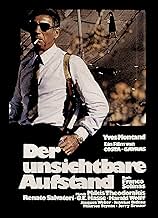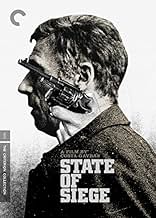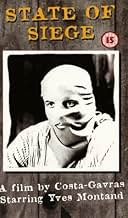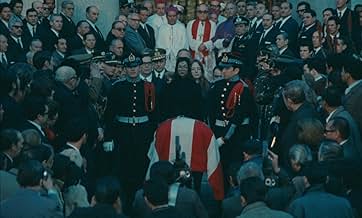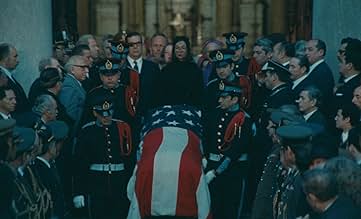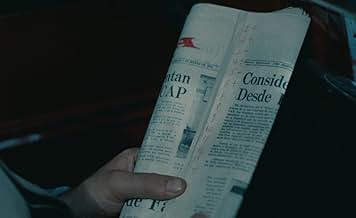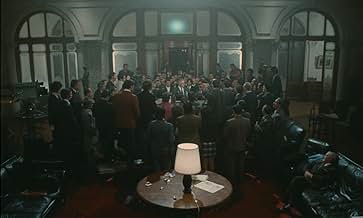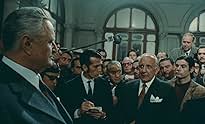अपनी भाषा में प्लॉट जोड़ेंUsing the interrogation of a US counterinsurgency agent as a backdrop, the film explores the consequences of the struggle between Uruguay's government and the leftist Tupamaro guerrillas.Using the interrogation of a US counterinsurgency agent as a backdrop, the film explores the consequences of the struggle between Uruguay's government and the leftist Tupamaro guerrillas.Using the interrogation of a US counterinsurgency agent as a backdrop, the film explores the consequences of the struggle between Uruguay's government and the leftist Tupamaro guerrillas.
- 1 BAFTA अवार्ड जीते गए
- 2 जीत और कुल 5 नामांकन
फ़ीचर्ड समीक्षाएं
"État de Siege" is a testimony of the history of Latin America in the 70's, during my childhood and adolescence. All the democratic governments elected by people were discharged through coup d'état by military dictatorships supported by the American government, the police and military forces trained in tortures by American advisors, student and union leaderships destroyed and revolutionary groups unsuccessfully fighting against the dictatorial regime. The fantastic director Costa Gravas exposes this serious wound in Latin America and this denunciation shall never be forgotten by the next generations. This movie remains amazingly real and important, sometimes recalling a documentary. Only this month this film was released on DVD in Brazil, and it is a worthwhile investment. My vote is ten.
Title (Brazil): 'Estado de Sítio" ("State of Siege")
Stunning third collaboration between Costa-Gavras and Yves Montand about the real-life of USAID (US Agency for International Development) employee Daniel Mitrione who is abducted by a bunch of urban guerrillas , being adapted from a true story , entirely filmed on location in South America . It contains a conspiracy-theory in similar style to subsequent Oliver Stone's JFK and similarly twisted and disturbing , whether you believe it or no . Displaying snazzy editing , adequate musical score by Mikis Theodorakis and atmospheric cinematography by Pierre-William Glenn . And shot on location in region Valparaíso, Cerro Playa Ancha, Viña Del Mar and Santiago De Chile. However , the movie sacrifices analysis and integrity in favour of an exploitative and popular polemic. Yves Montand gives a good acting , as usual . Being well accompanied by a fine support cast , such as : Renato Salvatori, O. E. Hasse , Jacques Wever , Jacques Perrin and Jean Luc Bideau .
The motion picture was compellingly directed by Constantine Costa-Gavras and it won Bafta , Golden Globes , New York Critics Awards . This veteran director who goes on shooting has filmed important , polemic and controversial movies , such as : "Z", "The Confession", "Special Section" , "Missing" , "Betrayed" , "Music Box" , "Against Oblivion" , "Mad City" , "Amen", "The Axe", among others . Rating : 7/10 , better than average .
The movie is a careful presentation, an expose, on the methods and procedures of law enforcement and state police in Latin America. Furthermore, it paints the picture of a kind of American neo-imperialism or neo-colonialism.
The movie is bold, the movie is courageous, but most of all it is smart and intelligent. That being said the strength of the film is the attention of detail and it's patience. Every situation is set up and for everything, there is a payoff. Nobody does films likes this nowadays, with hundreds of extras, everything shot on location. This is one extreme form of filmmaking, where there is the least amount of shortcuts and trickery. The movie almost feels like a film version of the Grand Reportage of old. A careful mix of investigation and photojournalism. That is why you do not mind being lectured. Because the film is beautiful and has rich texture, you do not mind sitting through police violence, death squad meetings and political corruption. The text of the movie might be heavy but is balanced by the visual style.
It may be at times too smart: some of the scenes may be too wordy and whenever there is action, it is subordinate to the dialog between characters. There is a lot of expository dialog in this film, and usually this a fault, because it goes against "show don't tell". Yet, here it does not harm the argument. The way the situation is laid out in dialog between Santore and his captors is initially dry and infuriating, but as Santore perception shifts it becomes engaging. The other channel of exposition is the reporter who is merely covering the story from the outside. It almost feels as it is the most interesting part of the film given that Santore's plot is rather stale, he gets kidnapped and they talk about it for an hour. The political plot could have been the meat of the movie but unfortunately, it does not go far enough, it is treated as B-plot. However, it still functions for its political themes. My favorite scene is the sequence where all the government ministers climb out of their cars. That is cinema in its purest form. It is complete fiction but it feels real.
You can regret that the movie is not as strong narratively. There is no a lot of action, in terms of narrative. Nothing happens in the course of the movie, only minor events. The story should be the last days of Phillip Michael Santore, but it is not what the movie is about.
For that reason it does not stand at the top of Costa-Gavras' oeuvre. On the topic of government corruption and the police and fascism love story, Gravas' "Z" is the best.
क्या आपको पता है
- ट्रिवियाThis was going to be the first movie shown in the new John F. Kennedy Center for the Performing Arts in Washington, D.C. It was cancelled because the plot of the movie was judged to be inappropriate. This caused a big controversy. A Washington D.C. television station took advantage of the controversy by acquiring the broadcast rights to the film and showing it uncut after running a big advertising campaign calling it the "film banned from the Kennedy Center."
- गूफ़The International Police Academy meeting, in the flashback, takes place in 1967. But mention is made that "Technological advances have put man on the moon," which would not occur until 1969.
- भाव
Woman Senator: The frequent use of torture's intruments has been proved by the investigating comission. Remember, that this comission is composed by members of all parties present in the parliament. Your conclusions, voted by uninamity, are those. First: it has been proved that torture has become a frequent and habitual system in our country. Second: those tortures are practiced against people who even being innocent, are not submitted to a legal questioning, and against people who, submitted to a legal questioning, would have been declared innocent. Third: the main victims of those methods are the students and the union leaders. Fourth: the explanations from competent authorities, which deny the existence of those methods or declare not even knowing about them, are unacceptable, because to accept them it would mean to admit the existence of paralel organizations, autonomous and uncontrolable inside our police system. That's it, Mr. President. Gentlemen, this is what's happening in our country. All of that occurs daily in our country. All of that must end in our country. Government lords, I don't know if you were aware or not about all that. Anyway, however, you no longer have the right to govern our country.
- कनेक्शनFeatured in La solitude du chanteur de fond (1974)
- साउंडट्रैकFantasia in G minor, BWV 542 ('Great')
(uncredited)
Written by Johann Sebastian Bach
Played by the organ at the end of the funeral near the end of the movie.
टॉप पसंद
- How long is State of Siege?Alexa द्वारा संचालित
विवरण
- रिलीज़ की तारीख़
- कंट्री ऑफ़ ओरिजिन
- भाषाएं
- इस रूप में भी जाना जाता है
- Opsadno stanje
- फ़िल्माने की जगहें
- उत्पादन कंपनियां
- IMDbPro पर और कंपनी क्रेडिट देखें
बॉक्स ऑफ़िस
- US और कनाडा में सकल
- $11,27,482
इस पेज में योगदान दें


![Bande-annonce [OV] देखें](https://m.media-amazon.com/images/M/MV5BNTlmZTlhYjktNThkYy00NDAyLTlkNjUtNDIwMTU3MmVhYTgyXkEyXkFqcGdeQXRyYW5zY29kZS13b3JrZmxvdw@@._V1_QL75_UX500_CR0)
